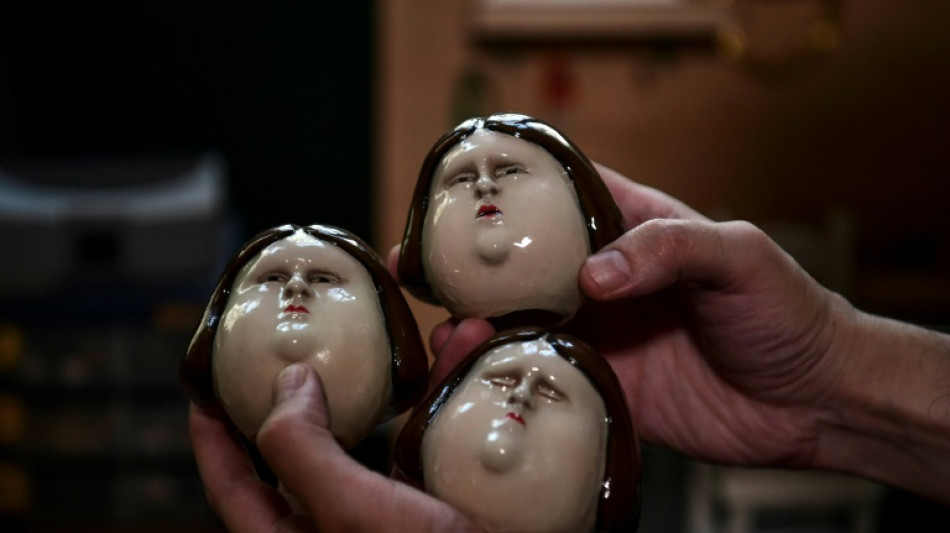
-
 Vonn to provide injury update as Milan-Cortina Olympics near
Vonn to provide injury update as Milan-Cortina Olympics near
-
France summons Musk for 'voluntary interview', raids X offices

-
 US judge to hear request for 'immediate takedown' of Epstein files
US judge to hear request for 'immediate takedown' of Epstein files
-
Russia resumes large-scale strikes on Ukraine in glacial temperatures

-
 Fit-again France captain Dupont partners Jalibert against Ireland
Fit-again France captain Dupont partners Jalibert against Ireland
-
French summons Musk for 'voluntary interview' as authorities raid X offices

-
 IOC chief Coventry calls for focus on sport, not politics
IOC chief Coventry calls for focus on sport, not politics
-
McNeil's partner hits out at 'brutal' football industry after Palace move collapses

-
 Proud moment as Prendergast brothers picked to start for Ireland
Proud moment as Prendergast brothers picked to start for Ireland
-
Germany has highest share of older workers in EU

-
 Teen swims four hours to save family lost at sea off Australia
Teen swims four hours to save family lost at sea off Australia
-
Ethiopia denies Trump claim mega-dam was financed by US

-
 Russia resumes strikes on freezing Ukrainian capital ahead of talks
Russia resumes strikes on freezing Ukrainian capital ahead of talks
-
Malaysian court acquits French man on drug charges

-
 Switch 2 sales boost Nintendo results but chip shortage looms
Switch 2 sales boost Nintendo results but chip shortage looms
-
From rations to G20's doorstep: Poland savours economic 'miracle'

-
 Russia resumes strikes on freezing Ukrainian capital
Russia resumes strikes on freezing Ukrainian capital
-
'Way too far': Latino Trump voters shocked by Minneapolis crackdown

-
 England and Brook seek redemption at T20 World Cup
England and Brook seek redemption at T20 World Cup
-
Coach Gambhir under pressure as India aim for back-to-back T20 triumphs

-
 'Helmets off': NFL stars open up as Super Bowl circus begins
'Helmets off': NFL stars open up as Super Bowl circus begins
-
Japan coach Jones says 'fair' World Cup schedule helps small teams

-
 Do not write Ireland off as a rugby force, says ex-prop Ross
Do not write Ireland off as a rugby force, says ex-prop Ross
-
Winter Olympics 2026: AFP guide to Alpine Skiing races

-
 Winter Olympics to showcase Italian venues and global tensions
Winter Olympics to showcase Italian venues and global tensions
-
Buoyant England eager to end Franco-Irish grip on Six Nations

-
 China to ban hidden car door handles in industry shift
China to ban hidden car door handles in industry shift
-
Sengun leads Rockets past Pacers, Ball leads Hornets fightback

-
 Waymo raises $16 bn to fuel global robotaxi expansion
Waymo raises $16 bn to fuel global robotaxi expansion
-
Netflix to livestream BTS comeback concert in K-pop mega event

-
 Rural India powers global AI models
Rural India powers global AI models
-
Equities, metals, oil rebound after Asia-wide rout

-
 Bencic, Svitolina make history as mothers inside tennis top 10
Bencic, Svitolina make history as mothers inside tennis top 10
-
Italy's spread-out Olympics face transport challenge

-
 Son of Norway crown princess stands trial for multiple rapes
Son of Norway crown princess stands trial for multiple rapes
-
Side hustle: Part-time refs take charge of Super Bowl

-
 Paying for a selfie: Rome starts charging for Trevi Fountain
Paying for a selfie: Rome starts charging for Trevi Fountain
-
Faced with Trump, Pope Leo opts for indirect diplomacy

-
 NFL chief expects Bad Bunny to unite Super Bowl audience
NFL chief expects Bad Bunny to unite Super Bowl audience
-
Australia's Hazlewood to miss start of T20 World Cup

-
 Bill, Hillary Clinton to testify in US House Epstein probe
Bill, Hillary Clinton to testify in US House Epstein probe
-
Cuba confirms 'communications' with US, but says no negotiations yet

-
 From 'watch his ass' to White House talks for Trump and Petro
From 'watch his ass' to White House talks for Trump and Petro
-
Trump says not 'ripping' down Kennedy Center -- much

-
 Sunderland rout 'childish' Burnley
Sunderland rout 'childish' Burnley
-
Musk merges xAI into SpaceX in bid to build space data centers

-
 Former France striker Benzema switches Saudi clubs
Former France striker Benzema switches Saudi clubs
-
Sunderland rout hapless Burnley

-
 Costa Rican president-elect looks to Bukele for help against crime
Costa Rican president-elect looks to Bukele for help against crime
-
Hosts Australia to open Rugby World Cup against Hong Kong


Chilean film 'Bestia' depicts torture with animation
Nominated for this year's Oscars, Chilean short film "Bestia" (Beast) uses animation, an art form more often associated with children's movies, to deal with a macabre topic: the sexual torture of women.
The 15-minute film about the life of Ingrid Olderock -- a particularly cruel agent of the dictatorship of Augusto Pinochet -- took 20 people three years to make.
It tells a story of the inner struggles of Olderock, the daughter of German Nazi sympathizers, who made it her life's work to psychologically break women prisoners, including using dogs to sexually assault them.
Olderock (1944-2001) worked at a detention center that specialized in the sexual torture of leftist Pinochet opponents.
"Bestia" employs the "stop motion" technique of photographing objects -- in this case dolls -- which are physically manipulated between frames. Those frames are then strung together in a series to create the impression of independent movement.
"Bestia" director Hugo Covarrubias, 44, talked to AFP about how he chose the topic -- and the medium -- to tell the story of one of the most sinister chapters of the Chilean dictatorship.
Q: Why Olderock?
A: She embodies the evil that reigned in Chile during the dictatorship... As a woman, she trained women to torture women.
A person so dedicated to breaking souls obviously has to have had her own broken at some point.
Olderock had many mental problems. She was a very paranoid woman, with a lot of trauma.
It (the film) is a psychological fiction, where we get inside her mind and try to show how all this mental trouble ends up representing an entire country. The trauma of a country (is seen) through the evil this woman represents.
Q: What is the role of her dog in the film?
A: One of the aspects we wanted to touch on was the intimate relationship with her dog.
She had three dogs, but we "fictionalized" that part and wanted to show the most important dog, which was Volodya, and little by little the film reveals what she does with the dog.
In reality, what she was doing was training dogs to commit torture, mainly to rape women.
Q: Why use stop-motion?
A: I’ve been working on this technique since 2005. It is basically what I know how to do. We like it because there is a plastic component, manual and analog, that allows us to create worlds that would be very difficult to create digitally.
We use miniature sets made of cardboard, and characters about 25 centimeters (10 inches) tall made with articulated steel, fabric and polyurethane.
Q: Why do you think the film has found acclaim abroad?
A: "Beast" stands out for the theme, the aesthetics, for the way in which this political topic is handled.
Also the genre: a psychological and political thriller that ended up being a short film that was quite different from the rest, which does not have a happy ending...
It is quite raw and powerful.
From time to time, people want this kind of power in a movie...
It causes different kinds of sensations, emotion and repulsion, it is a very strange experience. I think that the... sensations people experience with this short film -- I think it is what has made us get where we are.
Q: What does the Oscar nomination mean for you?
A: It gives more credibility to your film and obviously opens career doors for the film director and the team.
But the most important thing is the topic and the people who suffered this type of harassment.
---
Chile has three Oscars to date: Claudio Miranda won best photography for "Life of Pi" (2013), "Bear Story" (2014) won best animated short film, and "A Fantastic Woman" (2017) best foreign-language film.
"Bestia" has won prizes at the Clermont-Ferrand International Short Film Festival, the Annecy International Animation Film Festival and the Guadalajara International Film Festival.
O.Gaspar--PC

